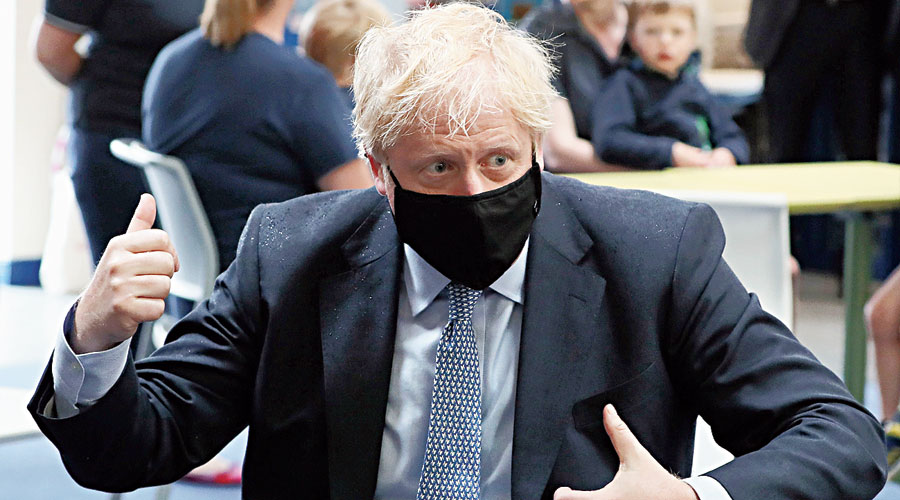Boris Johnson is hosting a virtual summit of G7 leaders on Tuesday when he will urge President Joe Biden to extend the August 31 deadline for the withdrawal of 6,000 US troops from Kabul airport.
If Biden or the Taliban do not agree to a request for such an extension, Britain plans to set up processing “hubs” for eligible Afghans who manage to flee across the border into Pakistan, Iran and several former Soviet states around Afghanistan.
Early indications from the Taliban are that the extension will not be granted.
The 31st was a red line, said Suhail Shaheen, the Taliban spokesman based in Doha. He said Biden had said troops would be out by that date, and extending it meant extending Afghanistan’s occupation.
“If they are intent on continuing the occupation it will provoke a reaction,” he warned.
The UK heads the G7 group of nations this year — which is made up of the US, Canada, France, Germany, Italy and Japan.
Downing Street said that Boris and Biden had “agreed on the need for the global community to come together to prevent a humanitarian crisis.
“The main focus of the G7 is on the long-term future of Afghanistan but they will of course be discussing the current evacuation effort”.
Britain’s defence secretary, Ben Wallace, who was reduced to tears in the early days of the Afghan crisis, confirmed on Monday: “The Prime Minister is, obviously at the G7, going to try and raise the prospect of seeing if the United States will extend.”
But he also made it clear that British troops could not remain in Kabul on their own: “It’s really important for people to understand the United States have over 6,000 people in Kabul airport and when they withdraw that will take away the framework, and we will have to go as well.
“I don’t think there is any likelihood of staying on after the United States. If their timetable extends even by a day or two, that will give us a day or two more to evacuate people. Because we are really down to hours now, not weeks, and we have to make sure we exploit every minute to get people out.”
Behind the scenes the Americans and the British are talking to the Taliban.
The UK’s armed forces minister James Heappey said: “Let’s be clear: although they might be the seven most powerful people on the planet meeting to discuss what they want to do — they don’t get to make the decision of themselves. The Taliban get a vote as well and that’s why in this building (the defence ministry in London) we are continuing to work to a deadline of 31 August.”
He revealed 6,631 people had been evacuated in the past week, and there would be nine flights over the next 24 hours.
“If there is no opportunity to extend (the deadline) – either because there’s not the international appetite to do so or perhaps more likely the Taliban are unwilling to allow us to — then we need to continue with our plans to be out by 31 August.”
He added: “The Taliban will have a choice: they can either seek to engage with the international community … or they can turn around and say: ‘No, there’s no opportunity for an extension.’ This is not just the discussion that happens among G7 leaders tomorrow. It’s a discussion that then happens with the Taliban.”
British soldiers had to be on alert for a terrorist attack at the airport in Kabul, he pointed out. “There is a very real threat posed by Islamic State. One of the most remarkable things about what our troops are doing is they that know there is a real threat of a suicide bomber, or some other sort of threat or attack, that means that with one hand they have to have their finger on the trigger, and on the other hand they’re holding people’s babies.”
The Afghan crisis has put the “special relationship” between the US and the UK under considerable strain. British requests for the Americans to slow down their pull out from Afghanistan apparently “fell on deaf ears”.
Jon Sopel, the BBC’s North America editor, summed up: “It is a statement of the reality of the ‘special relationship’, which is that when push comes to shove, it isn’t so special. America acted unilaterally over Afghanistan – actually maybe that should be Joe Biden acted unilaterally. He wanted out. The warnings of HM Government — and my understanding is they were made strenuously — fell on deaf, indifferent ears in Washington.
“In those circumstances, what is a British prime minister to do? The idea that the British armed forces could have swarmed in to fill the vacuum left by a US withdrawal is unrealistic.”











